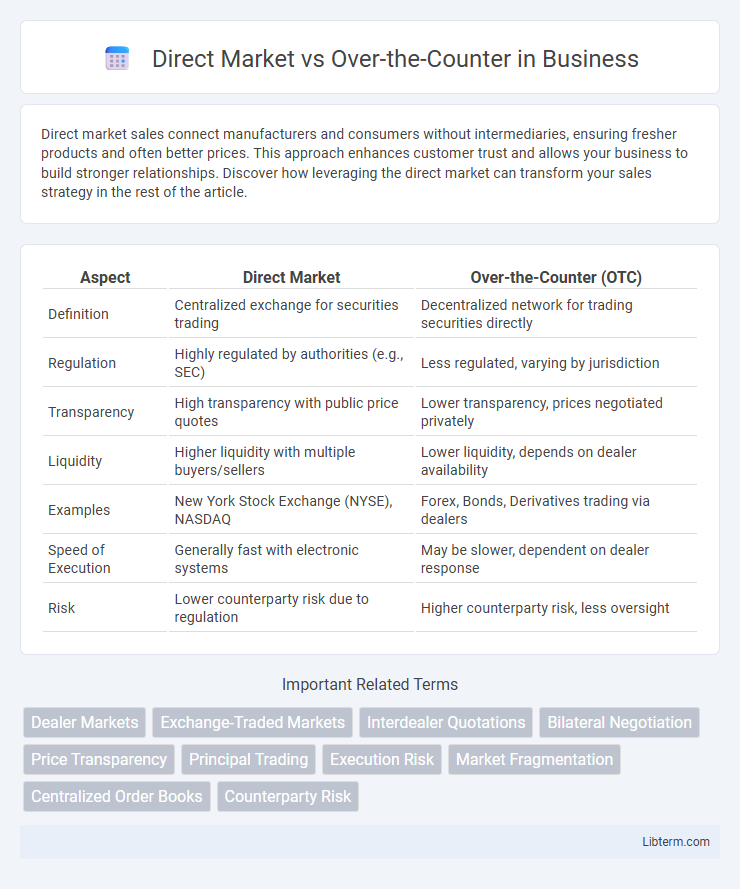Direct market sales connect manufacturers and consumers without intermediaries, ensuring fresher products and often better prices. This approach enhances customer trust and allows your business to build stronger relationships. Discover how leveraging the direct market can transform your sales strategy in the rest of the article.
Table of Comparison
| Aspect | Direct Market | Over-the-Counter (OTC) |
|---|---|---|
| Definition | Centralized exchange for securities trading | Decentralized network for trading securities directly |
| Regulation | Highly regulated by authorities (e.g., SEC) | Less regulated, varying by jurisdiction |
| Transparency | High transparency with public price quotes | Lower transparency, prices negotiated privately |
| Liquidity | Higher liquidity with multiple buyers/sellers | Lower liquidity, depends on dealer availability |
| Examples | New York Stock Exchange (NYSE), NASDAQ | Forex, Bonds, Derivatives trading via dealers |
| Speed of Execution | Generally fast with electronic systems | May be slower, dependent on dealer response |
| Risk | Lower counterparty risk due to regulation | Higher counterparty risk, less oversight |
Introduction to Direct Market and Over-the-Counter
Direct Market involves trading securities directly between buyers and sellers through centralized exchanges like the NYSE or NASDAQ, ensuring transparency and regulatory oversight. Over-the-Counter (OTC) transactions occur off-exchange, where securities such as stocks, bonds, and derivatives are traded via dealer networks, often with less stringent regulation and lower transparency. This distinction impacts liquidity, pricing, and risk management in financial markets.
Definitions: What Is Direct Market?
Direct Market refers to a trading platform where buyers and sellers engage in financial transactions directly without intermediaries, offering enhanced transparency and faster execution. It contrasts with Over-the-Counter (OTC) markets, where trading occurs through a network of dealers rather than a centralized exchange. Direct Markets are typically used for securities listed on formal exchanges, emphasizing regulated environments and real-time price discovery.
Definitions: What Is Over-the-Counter (OTC)?
Over-the-Counter (OTC) refers to the decentralized market where securities, currencies, and derivatives are traded directly between parties without a centralized exchange. OTC transactions occur through dealer networks, enabling customized contracts and flexible trading conditions that differ from the standardized procedures on a traditional direct market or stock exchange. This market structure often involves less transparency and higher counterparty risk compared to centralized exchanges.
Key Differences Between Direct Market and OTC
Direct markets involve centralized exchanges with standardized contracts and transparent pricing, while over-the-counter (OTC) markets consist of decentralized, personalized trading often done through dealer networks. Direct markets offer higher liquidity and regulatory oversight, whereas OTC transactions provide more flexibility and customization but carry higher counterparty risk. Price discovery in direct markets is public and efficient, contrasting with OTC markets where pricing is negotiated privately between parties.
Pros and Cons of Direct Market
Direct Market offers greater transparency by providing real-time pricing and standardized trading, which enhances investor confidence and market efficiency. However, it requires strict regulatory compliance and higher entry barriers, potentially limiting access for smaller investors. Direct Market also benefits from increased liquidity and lower counterparty risk compared to Over-the-Counter trades.
Pros and Cons of Over-the-Counter
Over-the-counter (OTC) trading offers greater flexibility with fewer regulatory requirements and access to a wider range of securities not listed on formal exchanges. However, OTC markets often have lower liquidity and higher volatility, leading to increased risk and wider bid-ask spreads. The lack of centralized oversight can result in less transparency and greater susceptibility to fraud or price manipulation.
Common Instruments Traded in Direct Market vs OTC
Common instruments traded in the direct market include stocks listed on major exchanges such as NYSE and NASDAQ, which offer high liquidity and transparent pricing. Over-the-counter (OTC) markets primarily handle unlisted securities, including penny stocks, bonds, derivatives, and foreign exchange instruments, often with less regulation and lower liquidity. The direct market typically involves standardized contracts with centralized clearing, whereas OTC trading offers customized instruments tailored to specific investor needs.
Regulatory Framework: Direct Market vs OTC
The regulatory framework for direct markets is generally stricter, with centralized exchanges enforcing standardized rules and oversight by national securities regulators such as the SEC in the United States or the FCA in the U.K. Over-the-counter (OTC) markets operate with less regulatory scrutiny, often involving bilateral negotiations and greater flexibility but higher counterparty risk. Direct market transactions offer enhanced transparency and compliance, while OTC markets provide greater customization and access to a wider range of securities not listed on formal exchanges.
Risks and Considerations in Trading
Trading on Direct Markets presents lower counterparty risk due to centralized clearing and regulatory oversight, ensuring greater transparency and price discovery. Over-the-Counter (OTC) trading carries higher risk from lack of standardization, limited liquidity, and potential for counterparty default, requiring robust due diligence and risk management strategies. Traders must carefully evaluate credit risk, market depth, and regulatory protections when choosing between Direct Market and OTC transactions.
Choosing Between Direct Market and Over-the-Counter
Choosing between Direct Market and Over-the-Counter (OTC) trading involves assessing factors like liquidity, transparency, and regulatory oversight. Direct Market offers higher transparency and stricter regulatory compliance, ideal for investors prioritizing security and real-time price discovery. OTC markets provide flexibility and access to less liquid or unlisted securities, suitable for customized transactions and trading in niche or hard-to-trade assets.
Direct Market Infographic

 libterm.com
libterm.com